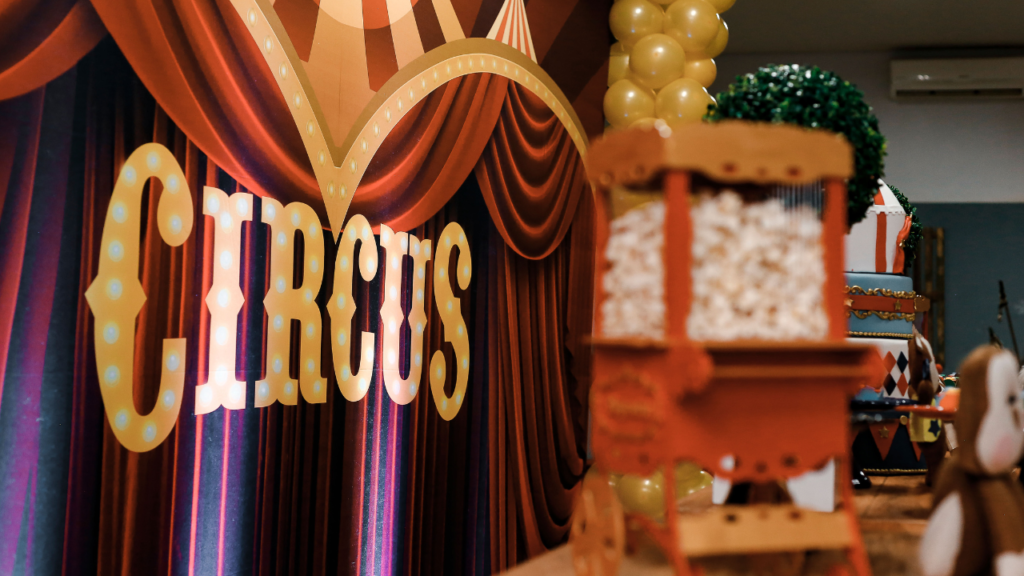Do you have any advice for a company having a hard time choosing a theme. Is a theme necessary?

If you have exasperated themes, or perhaps it’s just not comfortable for people to dress in “theme”, you can do just a color theme.
This is such a popular question. I take a step back and look at what the overall goal is for the event. Is there a message the company is looking to express, a motto? What is the company looking towards in the future… sales, marketing? With this, we can fabricate a custom theme to go along with the meeting.
Do we have to have a theme… no not at all. Some feel it is necessary, to fall back on to the standards – “Speak Easy”, “decades” (70s, 80s), Luau… but it’s not.
If you have exasperated themes, or perhaps it’s just not comfortable for people to dress in “theme”, you can do just a color theme… red party or maybe a Black and White Ball… classic and easy to create with decor and lighting.
A theme can be very powerful if strategically created and developed fully throughout the event.
A theme can be very powerful if strategically created and developed fully throughout the event. The theme will help connect stakeholders to the event’s purpose and their role in it. As a result, the content and experience will be more memorable, and the effects longer-lasting.
However, a theme is certainly not a prerequisite for a successful event, and when forced, a theme can actually have a counterproductive effect. All events – and all organizational event hosts – are different, so the decision on whether or not to have a theme must be considered on a case-by-case basis. Will a theme further the core goals of the event? If the answer is yes, designing one makes sense.
I don’t think a theme is necessary but you certainly want to work on consistency, and keeping the overall look harmonious and elegant.
I don’t think a theme is necessary but you certainly want to work on consistency, and keeping the overall look harmonious and elegant. It has to make sense, from the greeting to catering and mixology choices, decor, as well as entertainment.
A theme should be something that all audience members can connect with.
It can be kitschy but it also can be abstract. Don’t be afraid to be bold and different.
In my eyes, a theme is really how you represent the events’ purpose.
I wholeheartedly believe that a theme is a necessary element of a successful event. A theme does not need to be a tacky concept that most people may imagine. In my eyes, a theme is really how you represent the events’ purpose. For example, if the purpose of the event is to network, then networking can be your theme. Build your event elements around the five senses of what they see, smell, taste, touch, and hear, and connect each of them with networking.
A couple of examples of this could be, having the food created in a never-seen-before way or making it interactive, that way it sparks a conversation between attendees. Name badges could categorize the attendees into different groups that they have to search for and connect with throughout the day. There are so many ways you can bring a theme to fruition, without it looking too “theme-y”.
Before choosing the theme, though, you must consider the purpose of the event, the attendees, and the venue.
According to Forbes, the success of a company depends a great deal on positive employee morale and employee retention. Every company needs to make sure that their employees are satisfied with their jobs and their supervisors if they want to succeed in a cutthroat corporate world.
Before choosing the theme, though, you must consider the purpose of the event, the attendees, and the venue.
Here are ways to choose a theme:
https://www.thegreatevent.com/5-unforgettable-corporate-event-themes/
While a theme is not necessary, it does help to unify an event that has a more loose purpose.
While a theme is not necessary, it does help to unify an event that has a more loose purpose. A theme can be a color set (like your brand colors) or can be a story (past, present, future of your company). Your event planner will listen to your event goals and purpose and help you select a theme or unifying element that will best help you meet those goals.
I believe that every event and every piece of that event should contribute to a larger narrative.
I believe that every event and every piece of that event should contribute to a larger narrative. If it doesn’t, it’s not worth paying for. I recently had a big event where the client’s consultant was pushing to hire sky drummers. I told the CEO very clearly, this is a fun idea but it does nothing to tell the story of your company, it’s not worth the money. Every moment of the event from the invitation, to the entrance of the space, to the centerpieces on the tables should all be telling the same narrative.
A theme could be a simple word, a phrase or slogan, or a decade.
I love a good theme – it really helps to shape the day/week/event. My recommendation for choosing a theme is to brainstorm with key stakeholders and really think outside the box. A theme is a vision, a feeling, a moment in time. A theme could be a simple word, a phrase or slogan, or a decade. Think about what you want people to gain from this meeting, think about how you want them to remember the key messaging, and turn that into something fun and memorable.
Sometimes you can find inspirations, phrases, locations, or feelings to help create a theme.
When choosing a theme, do not get too overwhelmed with having to pick a certain topic or tangible theme. Sometimes you can find inspirations, phrases, locations, or feelings to help create a theme. Generally speaking when creating a theme, always talk with your client and gauge what they want. You may have some great underwater eco-idea, however, perhaps the client wants it to be a forest eco-idea.
Although you have to have general ideas and focus on what you want, you have to be open to taking your clients’ ideas and interpreting them in an eye-pleasing and cost-effective manner.
It is all about setting yourself apart from the rest.
SLS Event Planning and Consulting, LLC strongly encourages companies to review their overall business mission statement and goal for growth. Then taking that mission and connecting it to how they can help others in their industry and bring to the table the “thing” they need to help them grow. It is all about setting yourself apart from the rest. This will then help you with what will become your appropriate theme.
Theme to me is the same thing as the event promise.
Theme to me is the same thing as the event promise. Why in the world would your audience want to show up to your event. You need to have an event promise, it’s absolutely paramount. That’s what’s gonna get them into the door and that’s how you know how to set up the event so you know that you delivered what you promised.
So in our industry, in the Sales & Enrollment type of events, this tends to coincide with the offer that is being made from the stage. We know that our audience has a certain pain point that they’re looking to solve. With that, we design the event, the agenda, the run of show to support them in finding the answers to the problem and thus create the event promise.
Themes are necessary!
Themes are necessary! They do not have to be over the top themes, but the client and I need to agree upon the ultimate design aesthetic or else things will begin to get away from us. So the theme could be Disney or it could just be neutral and calming colors, as long as we aren’t trying to smash the two together? It allows for consistency, efficiency in design, and cohesiveness.
Most importantly, it allows the client to feel involved and important by having them decide on a theme. They could come to you with only keywords, but if you guide them to a theme that matches their keywords your client will feel as though they arrived at the destination first, which helps them feel confident in the design decisions.













